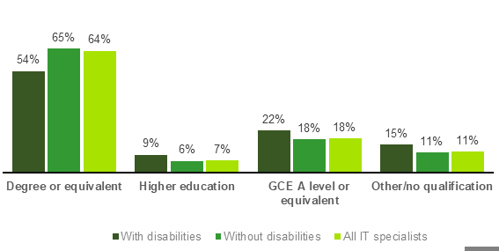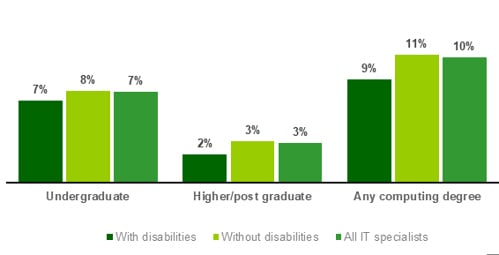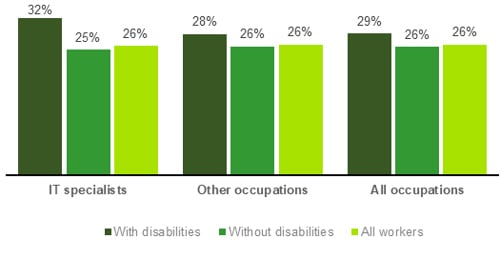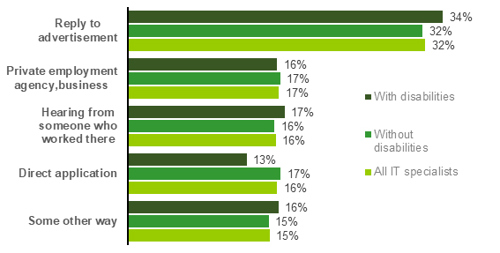Skills
Qualifications held
IT specialists are more highly qualified than other UK workers, and in 2022, more than seven in ten (71%) were thought to hold some form of higher-level qualification, compared with one half of workers as a whole (50%).
Overall, disabled IT specialists were also found to be more highly qualified than other workers with disabilities and in 2022 approximately 63% of IT specialists with disabilities held a degree/HE level qualification compared to 45% of workers with disabilities in other occupations.
Level of educational attainment amongst IT specialists (2022)

Source: Analysis of ONS Quarterly Labour Force Survey by BCS
In 2022, IT specialists with disabilities were less likely to hold a degree in an IT related discipline than those without disabilities working in such occupations with comparison figures of 9% and 11% respectively.
IT specialists holding computing degrees (2022)

Source: Analysis of ONS Quarterly Labour Force Survey by BCS
Skills development
Despite the arguably high skill/knowledge requirements associated with their work, IT specialists as a whole in the UK are no more likely than other workers to receive job-related education/training. Throughout 2022, on average 26% of IT specialists/all workers stated that they had received some form of job-related education/training in the previous 13 weeks.
For disabled IT specialists however the proportion receiving education/ training was notably higher (32%) — both when compared with disabled workers in other occupations (28%) and with other IT specialists without disabilities (25%).
Job-related education / training in the past 13 weeks (2022)

Source: Analysis of ONS Quarterly Labour Force Survey by BCS
Skills sourcing
As with other UK employees, the most common identifiable means of IT specialists[4] securing a job (where stated) is ‘replying to an advertisement’ with 32% of those that had been with their employer for less than one year over the 2018-22 period stating they had secured work in this manner.
The next most common way of IT specialists securing a job was via a private recruitment agency (17%).The likelihood of finding work by both these, and other means, appeared to be much the same for IT specialists with/without disabilities with the exception of direct applications where those with disabilities were less likely to have secured work via this route (comparison figures of 13% and 17% respectively for those with/without disabilities).
Means of finding work amongst IT specialists (2017-2022)

Source: Analysis of ONS Quarterly Labour Force Survey by BCS
[4] Employees / people on government schemes who have been with their current employer for less than one year/12 months prior to being interviewed for the LFS.













